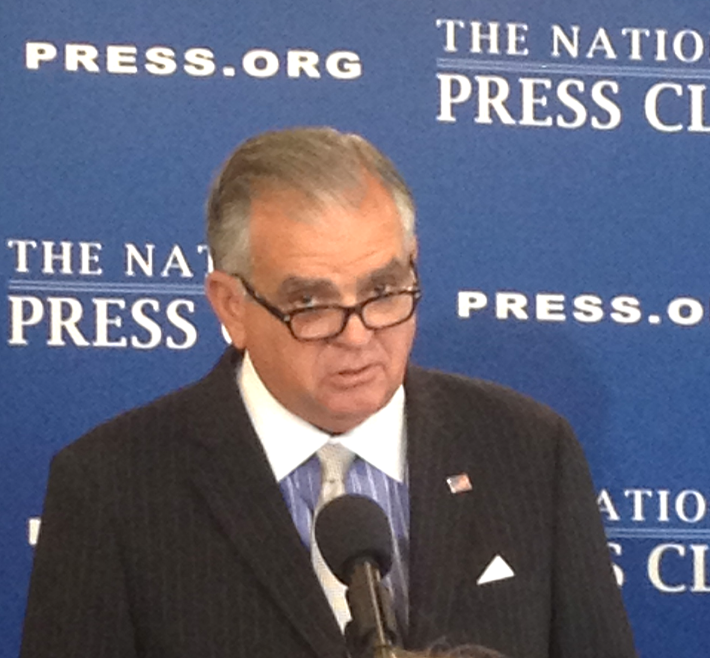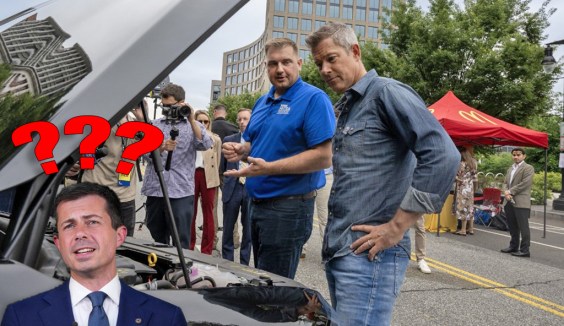Outgoing U.S. Transportation Secretary Ray LaHood said a few parting words yesterday at the National Press Club, just an hour before his successor, Anthony Foxx, was confirmed by the full Senate. The theme of LaHood's prepared remarks was bipartisanship, but he admits he's not seeing enough of it these days in Washington.
That could doom prospects for a long-term transportation bill to follow up MAP-21 when it expires at the end of the next fiscal year.
"I do think the prospects are pretty good in the Senate right now," LaHood said, drawing optimism from what he called a "healthy" debate on immigration in the upper chamber. But then he took a look at the House, where the farm bill recently fell apart, and said transportation could meet the same fate. "I think the prospects in the House are very dim right now."
At the same time, he said, a new, long-term bill is absolutely the most pressing issue facing the transportation sector. "America is one big pothole right now," he said.
LaHood touted the administration's achievements with the stimulus, pouring $48 billion into infrastructure and creating 65,000 jobs. And the cash-for-clunkers program, he said, persuaded Americans to buy 700,000 cars in the span of 30 days. When LaHood said later, "No administration has done more for the American car manufacturer than this administration," he wasn't kidding.
That line came in response to a question from Streetsblog about the decline in miles driven over the past few years. Did LaHood think it was a lasting trend, and if so, how should it affect U.S. DOT's planning and forecasting? "That's a question for somebody who's very intellectual and very smart," he said. "I haven't given much thought to that. I don't know the answer to that." And then he started touting the gifts the administration has given to carmakers.
"The kind of vehicles that people drive, I believe, will change dramatically," he said. With CAFE standards coming into effect, he thinks every family in America will have a hybrid. "Gasoline prices aren't going down! They're not going down."
So he envisions an America with different cars but not fewer cars? "I don't know about fewer cars," he said. "It seems like they're selling a heck of a lot of cars these days."
They're selling a lot of bikes too, though! (I thought I'd give him a chance to toot his own horn about all he's done for non-motorized modes of transportation, which advocates agree is more than any previous secretary ever had.) "This is the year of bike-share!" he announced, listing the cities where he's helped launch new systems.
LaHood also oversaw an awful lot of standard DOT fare. He said his department repaired or replaced over 20,000 bridges and "improved" over 350,000 miles of US roads -- much of that being maintenance, though a lot was road expansion, too. But the real signature work of the administration has been the push for high-speed rail. And despite the mixed success that project has had, LaHood says he has no regrets.
"I only know one person in Florida that wasn’t for high-speed rail," he said. "I only met one person in Wisconsin and Ohio that didn’t want high-speed rail. These are people without a transportation vision."
LaHood insists that California high-speed rail will be operational within 10 years and that the work on a national system will move forward. "High-speed rail is coming to America," he thundered. "We’re not going back."
"We built the interstate system. We built bridges," he said. "What we're going to do for the next generation is high-speed rail."
Along with that, of course, is a renewed investment in urban transit, including streetcars, which are now being manufactured in the United States again. "America is in the streetcar business," he said. Bus rapid transit, light rail, bike and pedestrian investments also have flourished under his leadership at DOT.
Streetsblog also gave the departing secretary a chance to vent some frustration about the difficult position he was often put in, trying to sell a deficit-hawk Congress on robust transportation plans that had no revenue stream attached to them. Did he think those ambitious plans might have more success with the legislative branch in the future if the president displayed more leadership on a funding solution?
LaHood answered that once the president gets through the climate initiative, immigration reform, gun legislation, he'll get right to work on infrastructure. And whatever he does, it'll be bold. On funding, specifically? "I think it'll be a bold vision."
He wouldn't go on record supporting a switch to a vehicle-miles-traveled fee -- something he got into trouble for early on -- but made it clear that the federal government has a strong role to play in funding infrastructure. "States don’t have the ability to raise the kind of money that's needed to keep their roads and bridges and transit in a state of good repair," he said. "That has to be a national priority."
Finally, LaHood said he was convinced that his mission to curb distracted driving has been institutionalized as a top priority at U.S. DOT. He urged all 50 states to pass distracted driving laws and said Congress should, too, though he insisted on staying vague on what kind of law he'd support at the national level. "Congress knows what to do," he said. "They’ll do it." He wouldn't take a position on lowering the blood-alcohol standard for drunk driving to .05 or installing ignition interlocks in cars, either.
The big question for a retiring public servant is always: What will you do next? He said more than he had previously, but still not much. He'd like to serve on some non-profit boards, perhaps for organizations with a safety mission. "The answer is, I have no plans," he said. "I'm going to take July and August, and hope the phone rings and see who's on the other end, and in the fall decide what the next chapter is." He said he'll split his time between Washington and Peoria and that we'll be hearing from him again.






